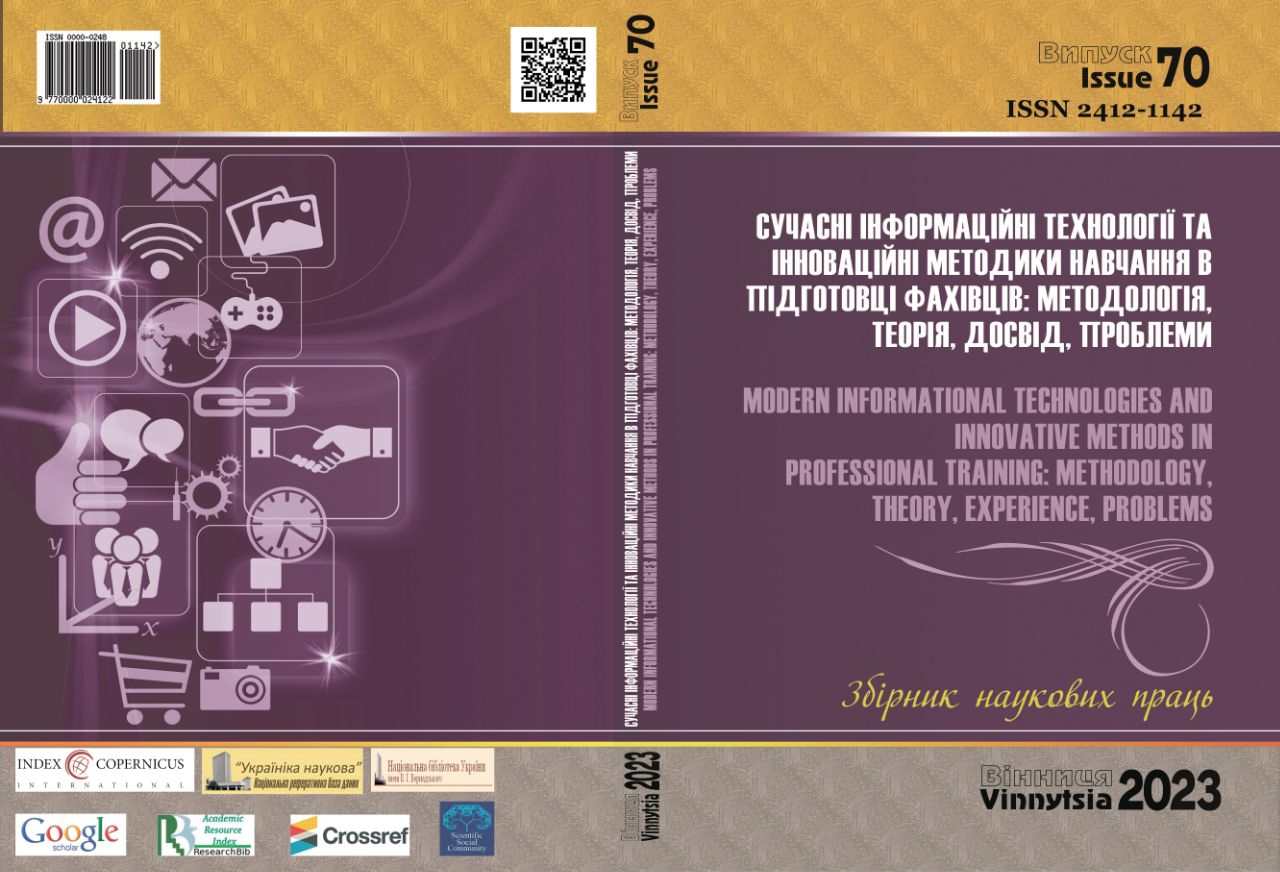SIMULATION OF THE FORMATION OF DIGITAL COMPETENCE OF FUTURETEACHERS OF PRIMARY GRADES IN PEDAGOGICAL HIGH SCHOOLS
DOI:
https://doi.org/10.31652/2412-1142-2023-70-122-130Keywords:
information technologies; model; modeling; training of future primary school teachers; digital competence; digital technologiesAbstract
In terms of the implementation of digital education, modern society is waiting for highly competent specialists who actively use digital educational resources and tools. For future primary school teachers, in the pedagogical education system of Ukraine, the formation of digital competence in the context of scientific and high-tech progress, globalization and informatization of society, and the requirements of the modern labor market is important. Modeling the formation of digital competence of future primary school teachers in pedagogical higher education institutions helps to understand the similarity of the activities of teachers and students aimed at solving common tasks of forming digital competence.Therefore, the model defines the logic of the formation of digital competence of future primary school teachers in pedagogical higher education institutions, reflects the main properties of the components, the connections between them, inherent in this process and essential for achieving the goal, and also integrates the goals, content and expected result of the formation of digital competence of future primary school teachers in pedagogical higher education institutions. The purpose of this article is to develop and theoretically substantiate a model for the formation of digital competence of future primary school teachers in pedagogical higher education institutions. The formation of digital competence of future primary school teachers in pedagogical higher education institutions is considered as a separate analogue of teacher and student activities aimed at solving general tasks. The scientific and methodological support of the model for the formation of digital competence of future primary school teachers in pedagogical higher education institutions, its tools (structure, criteria, indicators, levels, indicators) has been determined, which allows solving the problem of diagnosis, determining the strengths and weaknesses of the activities of students of pedagogical higher educational institutions from the organization of the educational process, to carry out long-term planning.
Downloads
References
Єжова О. О. Сутність організаційно-педагогічних умов педагогічного процесу. Наукові записки Ніжинського державного університету ім. Миколи Гоголя. Психолого-педагогічні науки. 2014. № 3. С. 39–43.
Житник Н. В. Організаційно-педагогічні умови підготовки бакалаврів економіки у коледжі ІІ рівня акредитації : дис. ... канд. пед. наук : 13.00.04 «Теорія і методика професійної освіти». Кривий Ріг, 2001. 223 с.
Закон України «Про вищу освіту», 2017. Електронний ресурс.. Доступно: http://zakon1.rada.gov.ua/laws/show/1556-18/page
Клокар Н. Андрагогічна модель підвищення кваліфікації педагогів на засадах диференційованого підходу. Післядипломна освіта в Україні. 2008. № 2. С. 23-28.
Лодатко Є. О. Моделювання в педагогіці: точки відліку. URL : Педагогічна наука: історія, теорія, практика, тенденції розвитку : е–журнал. 2010. Вип. № 1. httр://іntеllесt–іnvеst.оrg.uа/реdаgоg_еdіtіоns_еmаgаzіnе_ реdаgоgісаl (дата звернення: 04.08.2023).
Лодатко Е. А. Моделювання педагогічних систем і процесів : монографія.. Слов’янськ : СГПУ, 2010. 148 с.
Лодатко Є. О. Моделювання в педагогіці: точки відліку. URL : Педагогічна наука: історія, теорія, практика, тенденції розвитку : е–журнал. 2010. Вип. № 1. httр://іntеllесt–іnvеst.оrg.uа/реdаgоg_еdіtіоns_еmаgаzіnе_ реdаgоgісаl (дата звернення: 04.08.2023).
Лазаренко N. I., Гуревич R. S., Кобися A. P., Кобися V. M., і Опушко N. R. Моделювання підготовки магістрів професійної освіти до діяльності в інформаційно-цифровому середовищі. ІТЗН, Вип. 96, вип. 4, с. 137–151, Вер 2023. https://doi.org/10.33407/itlt.v96i4.5275
Моделювання професійної підготовки фахівців в умовах євроінтеграційних процесів: монографія / за ред. С. С. Вітвицької, доктора педагогічних наук, професора. Житомир: Вид. О. О. Євенок, 2019. 304 с.
Малихін О.В. Методологічні основи визначення дидактичних умов у дослідженнях з теорії навчання (у вищій школі). Наукові праці Чорноморського державного університету імені Петра Могили комплексу «Києво Могилянська академія». Серія: Педагогіка. 2013. Т. 215, Вип. 203. С. 11–14.
Стратегія розвитку вищої освіти в Україні на 2022 – 2032 р.(2022 р.) URL: https://www.kmu.gov.ua/npas/pro-shvalennya-strategiyi-rozvitku-vishchoyi-osviti-v-ukrayini-na-20222032- roki-286- (дата звернення: 04.09.2023)
Столяренко О. В., Столяренко О. В. Моделювання педагогічної діяльності у підготовці фахівця: навчально-методичний посібник. Вінниця : ТОВ «Нілан-ЛТД», 2015. 196 с.
Downloads
Published
Issue
Section
License
Copyright (c) 2023 Севастьянова Марина Сергіївна

This work is licensed under a Creative Commons Attribution 4.0 International License.

